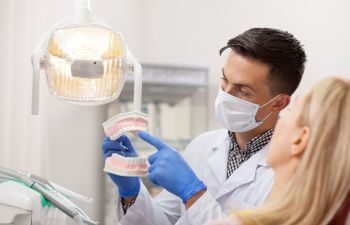
Teeth grinding is very common, and you may already be aware that you clench your teeth at night. Some people even grind their teeth during the day. Many, however, are not aware of the problem because it’s very mild or because they’ve been doing it so long that it’s just natural for them. The problem is that even mild cases of bruxism can lead to significant damage to your teeth and jaw over time.
Becoming aware of bruxism is a big step toward ensuring better dental health for years to come. Let’s learn more about it to decide if you are experiencing some of the tell-tale signs and symptoms of teeth grinding.
What is Bruxism?
Bruxism is simply the act of unconsciously grinding or clenching your teeth. Mild forms of bruxism may go unnoticed for years until more severe complications develop over time. However, if you are alert to the signs and symptoms, you may be able to prevent worsening dental issues later.
There are two types of bruxism: awake bruxism and sleep bruxism. If you unknowingly grind your teeth while awake, it’s most likely due to emotional or mental stress. Keep reading to learn more about lifestyle management to help reduce awake teeth grinding.
Teeth grinding while sleeping could be related to stress or could also be caused by a sleep disorder and linked to other medical conditions affecting the ability to sleep. A physician should identify such disorders through sleep studies and other diagnostic methods.
Occasionally, there are other causes of teeth grinding. For example, medication-induced bruxism is a rare side effect of some antipsychotic and antidepressant drugs. It’s important to note that there may not be an exact diagnosis for teeth grinding immediately.
How Many People Grind Their Teeth?
There have been dozens of studies on bruxism, and the statistics vary widely. We know that children are more likely to grind their teeth at night and gradually grow out of the involuntary movement. The statistics show the probability a person will suffer from teeth grinding goes down dramatically with age.
However, there are a lot of factors involved when determining who is at risk for bruxism. External stress, personality type, medications, genetics, other health conditions, smoking, drinking caffeine or alcohol and many other things can potentially cause or worsen teeth grinding. It’s difficult to say what percentage of people from any particular group could be impacted.
Bruxism and COVID-19
The National Library of Medicine reports that cases of bruxism are also increasing because of the increased psychological stress levels that many are facing due to the ongoing COVID-19 pandemic. Dentists are seeing more patients with symptoms of teeth grinding than ever before, leading to more awareness of the disorder. It has also led to a better understanding of bruxism and what can be done to address the issue.
The Many Symptoms of Bruxism
Mild bruxism may cause minimal symptoms that come and go, so it could be challenging to diagnose at first. However, if you experience even one or two of the below symptoms, you should see your dentist so they can look for any other signs that you clench or grind your teeth. If there is evidence that you do, steps can be taken early to prevent further damage to your teeth and jaw.
Symptoms of teeth grinding and clenching:
- Headache, earache or jaw pain
- Aching or sensitive teeth, primarily upon waking
- Aching or stiffness in your face or jaw
- Automatic jaw clenching when upset
- Cracked, chipped or otherwise damaged teeth
- Tooth indentations on the sides of the tongue
- Bite marks on the insides of the cheeks
- Loose teeth caused by the pressure of clenching
Possible Complications
According to the Sleep Foundation, teeth grinding and clenching at night, when a person doesn’t realize their strength, can exert up to 250 pounds of force. This force can lead to incredible damage to the teeth and the jaw. Temporomandibular joint disorder, or TMD, can cause bruxism, but it can also be made much worse by it. This is why proper diagnosis and management by an experienced dental team is essential.
Signs of Teeth Grinding:
- Severely worn teeth, exposing the dentin under the enamel
- Wear facets, or smooth areas on the biting surface of the tooth
- Chipped or cracked teeth
- Damage to tooth restorations
- Dislocated or locked jaw
- Popping or clicking temporomandibular joint (TMJ)
- Severe headaches
- Difficulty sleeping
Dental Treatment for Bruxism
One of the most common treatments for teeth grinding is a night guard. A night guard is a custom-made orthotic device worn while sleeping that helps to protect your teeth and jaw from the pressure created when clenching your teeth. Depending on the cause of the bruxism, if one has been identified, some people also benefit from a muscle relaxant medication taken before bedtime to help prevent grinding.
Biofeedback is a unique and interesting way to treat awake bruxism. A device measures muscle activity in the jaw and alerts you when there’s too much. Once you are aware of the increased muscle activity, you can consciously relax your jaw and change to a more natural position. If awake bruxism is a learned behavior over time due to long-term stress, this can be especially helpful, although not effective in treating sleep bruxism. Still, physical therapy may be prescribed to help train your jaw and facial muscles to relax into a neutral posture.
Lifestyle Management
Because many risk factors for bruxism are based on stress and daily living elements, there is much you can do to help resolve or lessen the severity of your bruxism. Alcohol, smoking and caffeine have all been shown to trigger teeth grinding, especially in those who have experienced it in the past. Avoiding them can go a long way to improving your symptoms.
Other lifestyle changes that can help improve teeth grinding:
- Cognitive Behavioral Therapy (CBT): CBT is a form of talk therapy that helps treat anxiety and depression and addresses other mental health issues
- Meditation: becoming more mindful can lead to less stress overall and feeling calmer in tense situations
- Physical exercise: a regular exercise routine can help to ease tension, frustration, and anger while giving you an energy boost
- Improve flexibility: through physical therapy or regular stretching throughout the day, improving the flexibility of your facial, jaw and neck muscles may help reduce clenching
When to See Your Dentist
If you notice any of the signs or symptoms listed above, you should schedule an appointment with your dentist to learn more and discuss the possibility of bruxism. They can look for indications that you clench or grind your teeth at night and start determining why. Even if the cause of the problem isn’t clear, your dentist may prescribe a night guard to help protect your teeth, even without a precise diagnosis.
If you are in any pain or discomfort from grinding or clenching your teeth, it’s essential to see an experienced dental team as soon as possible. Aesthetic & Implant Dentistry of Atlanta understands bruxism and has various treatments available that may help relieve your symptoms. Call our office today at (770) 955-0550 to schedule an appointment. We look forward to helping you live and sleep more comfortably.



